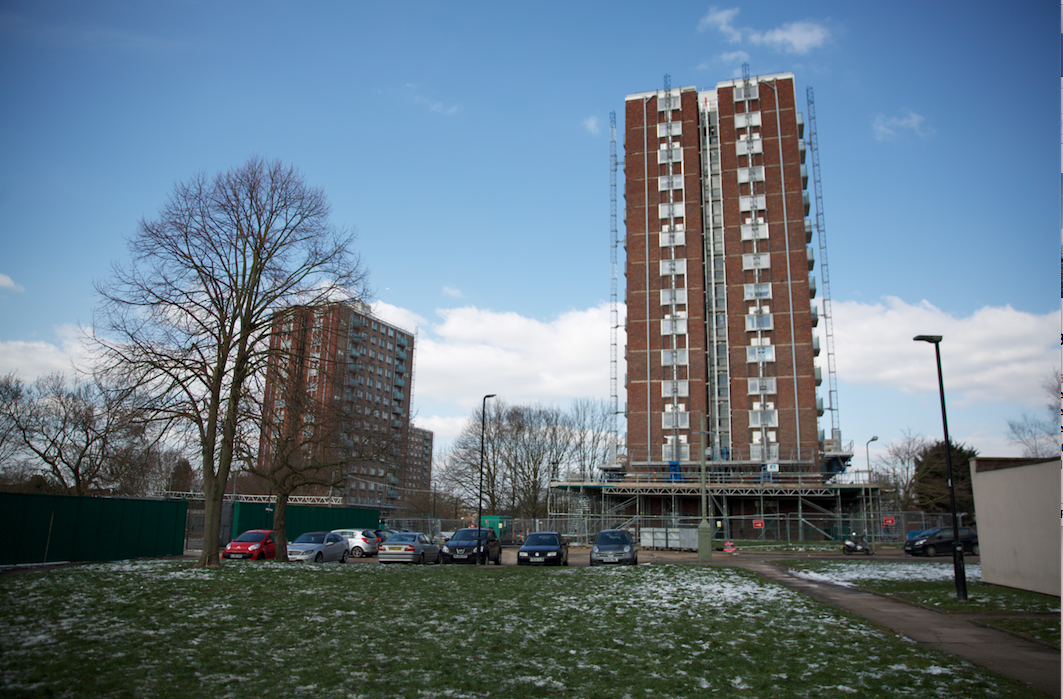Earlier this summer, residents of the Salford tower block, Spruce Court, asked to meet Grenfell survivors, and we organised for them to meet with Grenfell United, along with other residents of dangerous high rise blocks. The Grenfell community has long insisted on one legacy: no one else should suffer what they went through. They were instrumental in winning the promised £400 million to re-clad social housing, but are now forced to watch this work proceeding at a snail’s pace.
Residents of hundreds of buildings like Spruce Court continue to live with the same dangerous structures, materials and policies that destroyed so many lives, and, like Grenfell residents over the years leading up to the fire, continue to be ignored.
You can read the full guardian report of the link between these two flammable towers here. Below is our own comparison, the “Mirror Document” which helped to spark the Guardian report. There are many more buildings that still “mirror” Grenfell Tower as it was.
Join us for the AGM of Fuel Poverty Action – 13 September
Join us for the AGM of Fuel Poverty Action
Annual General Meeting
6.45pm for 7pm Thursday 13 September 2018
Crossroads Women’s Centre, 25 Wolsey Mews NW5 2DX (off Caversham Road) Fully wheelchair accessible
RSVP – please try to let us know if you’re coming. There will be some food to share.
Whether you are an old hand, occasional helper, an ally, or just want to find out a bit more, you are very welcome!
Following AGM business (6.45) and a report of the year’s activities, this AGM will focus on one issue: safe housing.
Speakers confirmed so far:
Elizabeth Okpo
Spruce Court Action Group, Salford, from a 22 storey block with Grenfell-style cladding and Nibe boilers
Anuj Vats
Leaseholder from Citiscape, Croydon, where cladding is now due to be replaced
Phil Murphy
Ex-fire fighter / safety officer, tower block resident and housing campaigner from Manchester who fought for lower prices on a district heating system – and won!
The Grenfell disaster exposed the chronic hazards in UK housing – often hidden behind a shiny facade – from the hazard of cold that kills nearly 10,000 a year, to the horror of fire, and the other hidden dangers from unsafe design and construction, poor standards and lack of effective regulation.
Fuel Poverty Action has been heavily engaged in the fight for warm, safe housing, and we invite you to discuss it with some experts on this issue and help explore next steps in our campaign for Safe Cladding and Insulation Now.
Fuel Poverty Action is welcoming new members, and people who want to work with us in other ways. Come along and raise your own issues, find out what’s happening, and consider how you might be part of it.
For a brief update on recent activities see here.
Partial victories for warmth and safety in a Trafford Housing Trust tower block
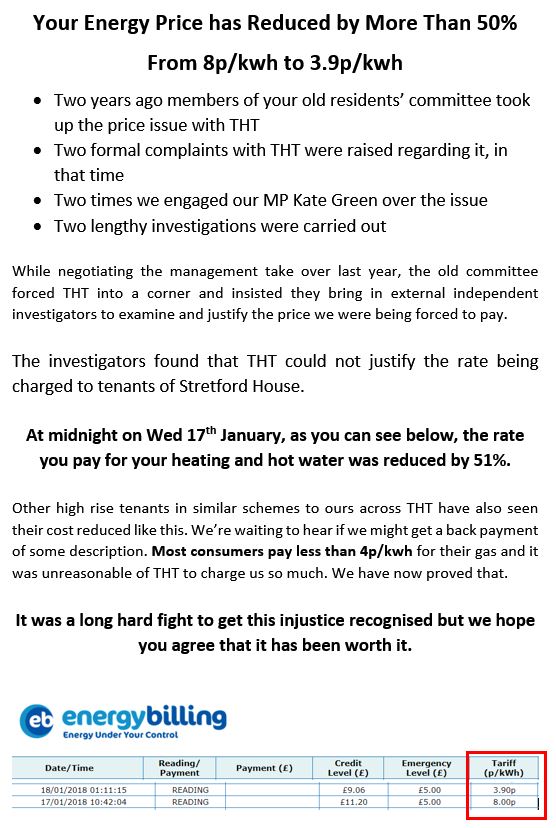
Tenants and residents can take heart from what has been won so far at Stretford House in Trafford. In 2010, as part of a refurbishment, a new communal heating system was installed (aka “district heating”) that in this case cost much more, and was not capable of keeping the flats warm. The works to install the new system also compromised the building’s fire safety. Action by the former Chair of the TRA has now brought major improvements on both those fronts, although there is a long way to go. Heating tariffs have been halved.
The following account is by Stretford House resident and former Tenants and Residents Association chair Phil Murphy, who is a former Fire Safety Officer with Greater Manchester Fire and Rescue Service (GMFRS).
* * * *
It was more than eight years ago when Trafford Housing Trust carried out a major refurb at Stretford House, a 23 storey single staircase property.
The works planned initially included:
- New windows – the existing being past their life span were, in some cases, leaking
- Insulating the building with an external rainscreen cladding system
- New flat entrance doors and fire doors through the common areas
- New bathrooms
- New kitchens
- New communal heating & hot water system
The new district heating system cost doubled twice and it left us cold
Up until that time every flat had a warm air system fed through their own gas meter. It wasn’t expensive and we could all switch suppliers as we paid our own gas bills. The new system, brought into our block and other THT tower blocks, has centralised boilers which feed hot water to heat exchangers in each flat. Tenants had no choice, we had to accept this, although leaseholders could opt out and some did hang onto their old warm air systems.
When the new system was to be brought in, they told us it would halve what we had to pay for heating and hot water. That is not how it worked out. .
When the heat output of the new heating system was specified it was expected that it would be working in flats with new insulation and new windows. Following completion of all of the works except the windows and cladding, the programme was discontinued. Not only did this leave residents with a system operating without the expected insulation improvements, but the system was also not functioning correctly for many flats. It took three years to get the heating system working correctly. It required the installation of new major pumps (indicating an incorrect specification in the first instance), new filters, and the whole system needed to be flushed out to remove debris from inside the system.
Many of the complaints over the three year period were not formally logged as complaints. At one point there were so many issues arising that the trust’s heating manager was in the foyer noting issues by hand, these issues were never logged as repairs. This means the trust’s published repairs and complaints for this period remain wildly inaccurate and don’t not reflect the nightmare tenants in Stretford House were enduring. For us, the fight was draining.
During that period the system wasn’t operating as it should. It struggled to heat flats that were supposed to have improved windows and insulation. This resulted in some tenants having their heating on permanently and yet reporting that their flats never reached an acceptable temperature. Having the heating on for extended periods saw tenants receiving vastly increased energy bills.
Meanwhile the energy charges set by the trust ignored the issues, and having initially priced the unit cost at 2p/kwh, providing the energy savings that was promised to tenants before they were forced to accept the new system, the trust now had a monopoly on this energy (residents are unable to switch suppliers) and swiftly doubled the cost to 4p/kwh without even bothering to inform residents. Falling gas prices meant that residents were now paying significantly above the average consumer rate being charged by the big six domestic energy suppliers. The following year they doubled it again to 8p/kwh.
Residents now had a heating and hot water system that didn’t work, they were without the planned efficiency savings of new windows and insulation, and were paying in excess of double that of their neighbours in houses in the surrounding streets. I exhausted THT’s formal complaints procedure to no avail, twice. The saga began before I spent a year as Chair of the residents association and dragged on after that period
Fire safety
In addition, in installing the system, the contractors had totally trashed the compartmentation that was supposed to protect us from the spread of fire. There were holes in every flat, and between flats, that fire and smoke could come through.
In addition, some residents became so concerned about bills that they were relying entirely on the small fan heaters that the caretaker was distributing free of charge in acknowledgement of the issues. Even though this presents a fire risk residents were not advised of the increased risks.
What we did
As it happens, I am a former fire fighter and fire safety officer, and I was painfully aware of the danger. Inspired by the work of Stuart Hodkinson and Fuel Poverty Action, I wrote to my MP Kate Green detailing my concerns surrounding the adequacy of fire risk assessments, especially compartmentation that had been penetrated throughout the block with the installation of the new heating systems’ pipework, and the energy prices being forced on residents by the energy-monopoly landlords.
Having experienced the complaints procedure I took a different route and used my fire engineering knowledge to compose a fourteen page forensic analysis of the fire safety problems I suspected might exist. I gave it to a GMFRS Fire Safety Officer who demanded immediate improvements. It turned out that everything in the report was correct. This was after Grenfell.
Results!
Fire safety improved: The day after I submitted my 14 page report there were 20 vans (I have pictures) on the car park and a huge team of experts started working their way through the block. Every flat, every riser, every common area had serious compartmentation problems. It took them ten months of working every day (I estimate a cost around £1 million) to put it right. An example of what they had to do: https://youtu.be/dYD1taS9ocM
Heating price halved: At the start of this year the independent expert concluded that the price could not be justified. The price was dropped from 8p/kwh to 3.9p/kwh and all residents received a refund amounting to the unnecessary charge they paid for the last 12 months (in most cases this ranged between £200 and £350).
However residents had been paying the super-charged energy rate for five years. While they await to see whether they’ll receive the full refund to which they are entitled, Trafford Housing Trust have brought in another independent consultant, presumably in an attempt to justify charging residents far in excess of what the trust are paying for the energy. Residents are wondering whether they’ll get the money they are owed, whether other tenants across the trust have also received a refund to which they are entitled, and whether they’ll have to switch to fan heaters again that carry an increased fire risk and are expensive to run but are at least easily controlled to limit their energy bills.
Burning Gas at Drax Power Station – Voice your Objections
Drax power station has applied to the Planning Inspectorate for permission to replace its two remaining coal-fired units with much larger ones burning fossil (natural) gas. You can read the full response we’ve submitted to this here.
Summer report – and object to Drax power station proposals!
Greetings!
As some things slow down for the summer, we wanted to share a brief update, and a “hold the date” for Fuel Poverty Action’s coming AGM, which is scheduled for 13 September.
Help stop Drax:
Before that, however, can we draw your attention to the request for objections to Drax power station’s plans to create the UK’s largest gas-fired plant to date, at a time when fossil fuels must urgently be phased out. Biofuelwatch asked us to spread the word on this. This year’s extreme temperatures are now making summer another dangerous season, with heat waves as lethal as cold. There is also the danger of air conditioning – for those who can afford it – further increasing carbon emissions and causing a vicious spiral of climate change, cost, and deaths. Biofuelwatch’s tweets and a facebook post for sharing are below. They also have a model response to the consultation (deadline 29 August), and we have a draft ourselves if you’d like to see it.
FPA Update:
It’s been a very busy few months, pressing for
- an effective cap on energy prices (See e.g. here, here (with DPAC) and on Victoria Derbyshire Show here),
- a fairer deal for people with district or communal heating systems, (see eg here and here),
- better insulation where low and unenforced building standards have left residents in the cold (see here and here),
- relief for people in hard to heat rural homes with oil-fired heating (here and here), this has helped change government policy
- non-profit, democratically controlled municipal energy (eg here and here),
and at the same time, we have
- stood up for lots of individuals and residents’ groups in battles with their energy or heat suppliers, and landlords, private or social.
- republished our MiniGuide to energy customers rights (now expanded with information on rights in relation to landlords),
- responded to several GLA and other consultations on housing policies and on fuel poverty,
- spoke at and participated in Housing Justice conference in Liverpool, forming a new coalition
- combined forces with organisations of pensioners, asylum seekers, and people with disabilities, and been active participants in the End Fuel Poverty Coalition, the Radical Housing Network, the movement to divest from fossil fuels, the Right to Energy coalition, aiming to eliminate energy poverty in Europe, and more.
Safe Cladding and Insulation Now!
For the last six months, however, the lion’s share of our energy has gone into starting the SCIN campaign for Safe Cladding and Insulation Now, following the appalling loss of life at Grenfell Tower. If you haven’t been seeing our mailings about this, have a quick skim of the website front page and News, and see more under “Cladding and Insulation” tab – including the Open Letter to the Secretary of State (for organisations, politicians, etc to sign), ways to affiliate, personal testimonies from people suffering cold or in fire-risk buildings, and model motions for trade unions and political parties. In the last few weeks we’ve been working with Grenfell United to back up residents of an estate in Salford which has the same cladding and insulation as Grenfell. We expect to deliver the Open Letter in October, with a demonstration/event.
Please see what you can do – for the sake of both the people who must go to sleep in buildings that could go up in flames, and the people who may end up freezing next winter, as many did last year, when cladding has been removed and not replaced. The dangerous state of UK homes, old and new, is a national disgrace and an emergency. No more residents should pay for this with their health or with their lives.
In fact, we welcome help of all sorts, from joining our core team to spreading the word on social media or helping on a one-off basis, eg organising events, or going door to door on housing estates. Just get in touch and let us know, or come along to our AGM, we’ll be very glad to meet you!
Meanwhile, FPA still has no funding! We rely on voluntary labour (lots!) but also on the generosity and determination of our friends. A “donate” button can be found on our website here. We have made time to do some funding applications. Offers of fundraising events are also very welcome, and a good way of spreading the word, as well — we’d be glad to help.
* * *
On Drax, please share:
https://twitter.com/biofuelwatch/status/1021706758107156480
https://www.facebook.com/Biofuelwatch/posts/2149840821754870
Hope to see you on 13 September – or to hear from you, before!
CMA call for heat networks regulation – but leaseholders’ crisis is ignored
Fuel Poverty Action are glad to see the CMA’s recommendation for regulation of heat networks – which is long overdue – and the acknowledgment that while some customers benefit from District Heating, others are trapped with high prices and regular outages. With the government poised to release £320 million of public money for heat networks this autumn, consumer protection is urgent. As well as regulation, this protection must be built into low carbon planning requirements. And it must include protection from the common problem of overheating, summer and winter.
However, one outstanding issue does not seem to have been addressed, despite FPA specifically raising this with the CMA when they consulted us, and in our response to their Statement of Scope (a response they do refer to in relation to reliability): The huge demands on leaseholders for capital when a heating system is deemed to require further expenditure — often extending beyond repair to major extension or improvements.
Ruth London from Fuel Poverty Action said,
“Demands for tens of thousands of pounds each, on top of high standing charges for maintenance, go beyond what leaseholders can be expected to budget for and are not reasonable: freeholders and heat suppliers are in effect asking these individual householders to finance an infrastructure development in UK heating.
“This is similar to the demands being made on residents of tower blocks clad in the same combustible materials as Grenfell Tower, who are also being asked for five figure sums to remove and replace their own cladding. Here too, the materials chosen by developers were not chosen by residents, and they should not be asked to pay the cost for others mistakes or cost-cutting decisions. Many simply do not have the money to do so.”
The very weak legal position of leaseholders in the UK has recently been the subject of much debate in the media and in Parliament including a recent debate led by Leasehold Knowledge, with input from residents of many residents associations.
FPA have worked with leasehold residents in several estates who are fighting such demands in court, who would be ready to speak to the media.
One says,
“On my estate over 80% of leaseholders have moved out or now rent their flats and live elsewhere outside of London to pay the debt.”
Another says,
“Many of the leaseholders are pensioners and they are simply too old to move and organise renting out their dilapidated flats, the money will simply come from their food.”
FPA response to new proposals for ECO scheme
The government published proposals for the ECO (Energy Company Obligation) scheme due to come to force in October 2018. FPA wrote with our concerns that the proposals, by excluding oil, risk the lives of rural residents. We also prompted a personal response from an oil customer in a rural home with no other realistic way to heat his family’s home. In August 2018 we learned that in a surprise change from their original consultation, BEIS have announced that they will continue to allow new oil boilers to be installed under ECO3 under the ‘Broken Boiler Cap’ (of 35,000 systems per year equivalent). BEIS expects that new oil boilers will be delivered mostly in rural areas. In addition, a 400% uplift will be available to provide support for the replacement of broken boilers (including oil-fired boilers) under the cap to low income, “vulnerable” and fuel poor households.
Read our letter to Claire Perry, the Minister of State for Energy and Clean Growth below:
Letter to BEIS on Oil and Fuel Poverty
Still in Danger One Year On
Before the government conceded the principle by promising to “fully fund” the replacement of Grenfell-style cladding, FPA had collected over 60 signatures from MPs, community organisers, campaigners, trade unions, and resident associations on an open letter that demanded that the government release the money to make people safe and warm. Though the victory in £400 million cannot be understated, the money and promises don’t nearly go far enough in ensuring peoples’ homes are made safe from fire, nor does it promise vital guarantees to keep people warm over the winter when remediation works are underway and cladding and insulation is off. FPA spoke to many people left out in the cold and suffering in freezing homes last winter, whilst their insulation was off. Cold, like fire, kills.
FPA have redrafted their letter and sent it out to be signed. The new letter presses on a set of urgent demands that the government needs to meet and will be delivered to the Secretary for Housing, Communities and Local Government this October.
Please read and share.
Solidarity.
.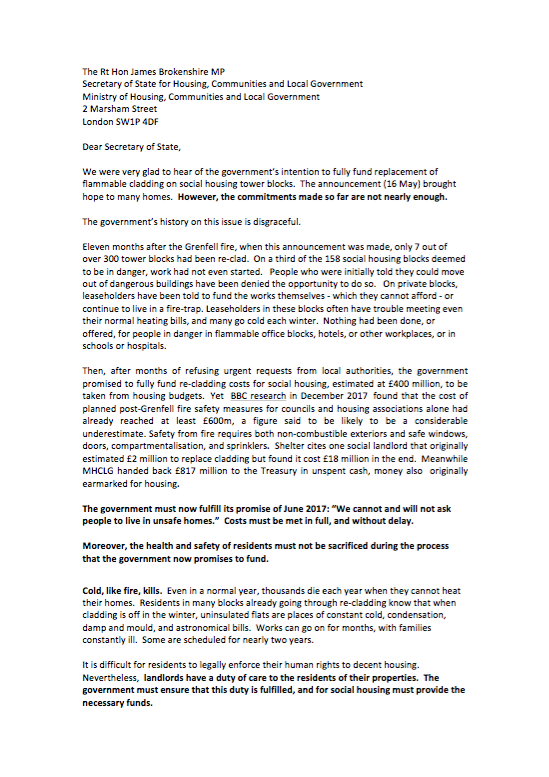
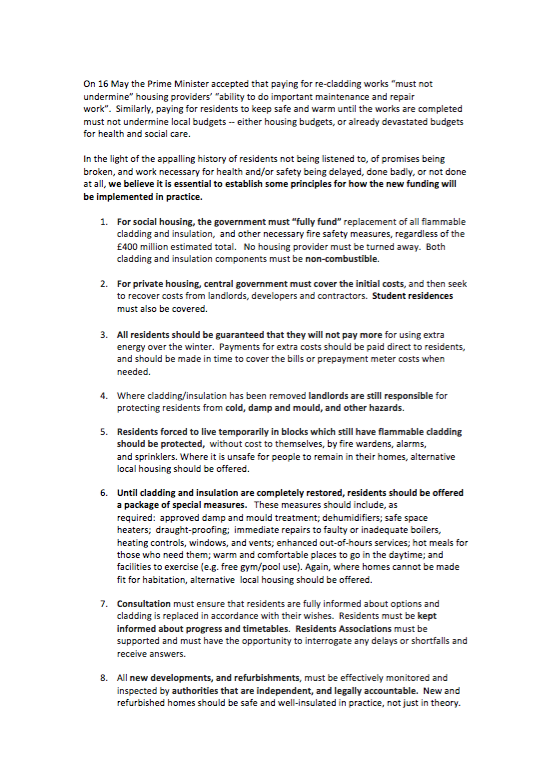

Vital questions Grenfell inquiry must not duck – our letter in The Guardian
The Guardian have published FPA’s letter about housing safety post Grenfell. Read it here https://www.theguardian.com/uk-news/2018/jun/10/vital-questions-grenfell-inquiry-must-not-duck
Still Not Safe — news from a Salford tower block
On the anniversary of Grenfell, I have been asked to write this blog post describing what its like living in a high-rise building with dangerous cladding on it like Grenfell had. My name is Elizabeth and I live in a 22 story high rise housing association block in Salford, managed by Pendleton Together and owned by Salford council.
The block has flammable cladding. And a year on from the tragedy it still has the cladding on it except for the first three floors. And it’s been terrible living here since the tragic events for several reasons. Since the Grenfell fire me and several residents haven’t been able to sleep well and have been too scared to sleep, especially in the first few weeks. We were first promised that if anyone wanted to move they should just go to the Housing Association and they would look at our cases fairly. But unfortunately many residents, even the ones with kids on high floors and people with health problems and people with doctors letters recommending they are moved, have been denied a move. This has upset residents a lot since many kids and people with health problems died in Grenfell .
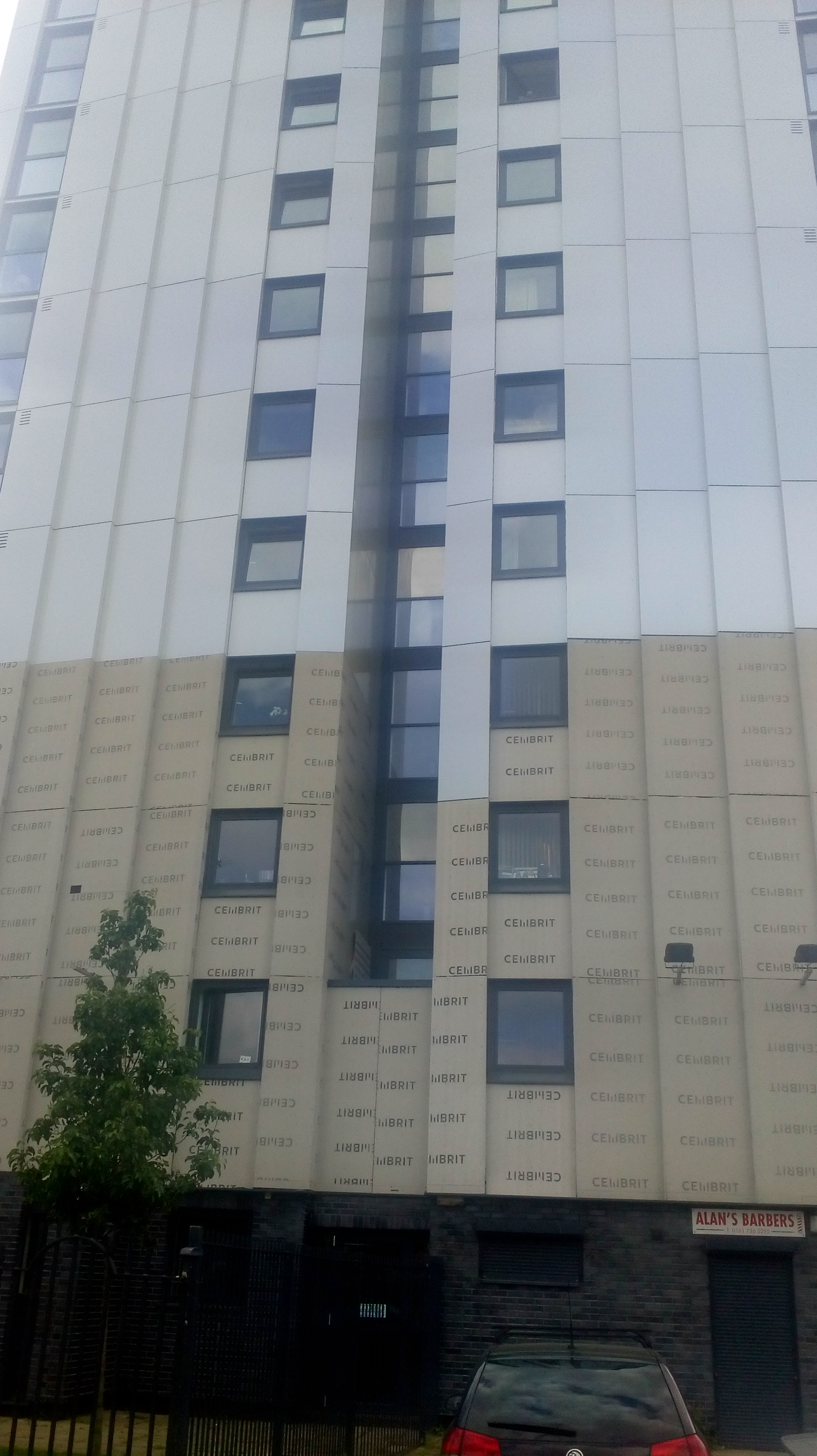
We have been told that removing the cladding is going to take two years and that they’re looking at installing sprinklers in the all the high rise blocks. A month after the Grenfell fire the mayor of Salford, Paul Dennett , said he would remove the cladding and that he wouldn’t wait for the report from the national and local government on testing whether the cladding that’s on our blocks is flammable like Grenfell. And that he would borrow £25 million pounds to get the cladding off and keep residents safe. Unfortunately, Pendleton Together only removed the first three rows, and a year later my block and many other blocks managed by Pendleton Together still have the major part of the cladding still on. Cladding only came off for the camera news crews and work stopped when the camera and TV news crews stopped filming.
There was a meeting I attended about a month after the Grenfell tragedy, which was held in Salford youth theatre, where the deputy mayor and other various speakers came to talk about Grenfell. When the meeting got heated the deputy mayor of Salford said we should be thankful he came, as he didn’t have to come to the meeting to let local residents know what the Salford Council was going to do about our unsafe home. He stated that the Salford council only had £25 million in its reserves, unlike Kensington and Chelsea, the council that the Grenfell Tower falls under.
In my block there is an internal fire alarm. When it goes off it only rings in the two exit stairwells which are located at both ends of the building, not the hallway, not the flats as it’s not connected to ring all the fire alarms to alert residents there is a fire in the building and to evacuate. The fire alarm is so quiet because the sound is coming from the stairwell. When it goes off, many residents don’t hear it. I and others have complained about that but nothing has been done.
We have had four fire alarms where residents had been told to evacuate the building and many residents were still inside with their kids and said they didn’t hear it. That’s no surprise since nobody lives in the stairwell. I slept through one fire alarm as I couldn’t hear it as I was sleeping and it’s too quiet. If you have the TV or music on you might not hear it, or if you’re sleeping.
Secondly we have no fire blankets or small fire extinguishers to put out small fires, like many flats have for safety.
Thirdly we have no Tenants Association due to the fact the housing association locked us out of the community room and said not enough people attend the meeting. We usually have between 5 and 10 people at our tenants meeting, but they said it’s not enough. So we can’t make an official complaint as the Tenants Association meeting as we aren’t official. It’s been like that for two years now. Our community room has never been open to the tenants officially, it’s been used by the cleaners and by other blocks for their meetings, which is very unfair.
If one tenant types a letter expressing the complaints of several tenants, the Housing Association will target the person whose address is on the letter and say that they’re the only one complaining. We have to put a resident’s address on the letters as a reply address, as the community room doesn’t have an address or letterbox, that was binned after the refurbishment
We were promised raised beds to grow vegetables and fruit since many residents are on low incomes. We were hoping to donate the vegetables and fruit to the food bank but that never materialized even though it was on the plans of the refurbishment of the block.
We also have very expensive heating system called the NIBE system , that many residents can’t afford and that other housing associations have had to rip out due to expensive bills that it causes for residents. Residents have complained about the NIBE but the Housing Association has just blamed the residents and said they haven’t use the NIBE properly.
The major refurbishment of our block included an electricity installation, and it’s caused many power surges that have tripped the electricity in my flat and others’ flats. My cooker which was only a year and half old tripped my electricity and cut all my electricity off in my flat due to a power surge. I called out the housing association, they sent an electrician who said it was my cooker. I then called the manufacturer who tested my cooker and said there was nothing wrong with it. My friend who lives in another flat also had problems with her cooker ever since the electricity refit. Her cooker is not working properly. We have never been offered any compensation and being unemployed I had to pay the bill just for the manufacturer to tell me there nothing wrong with my cooker.
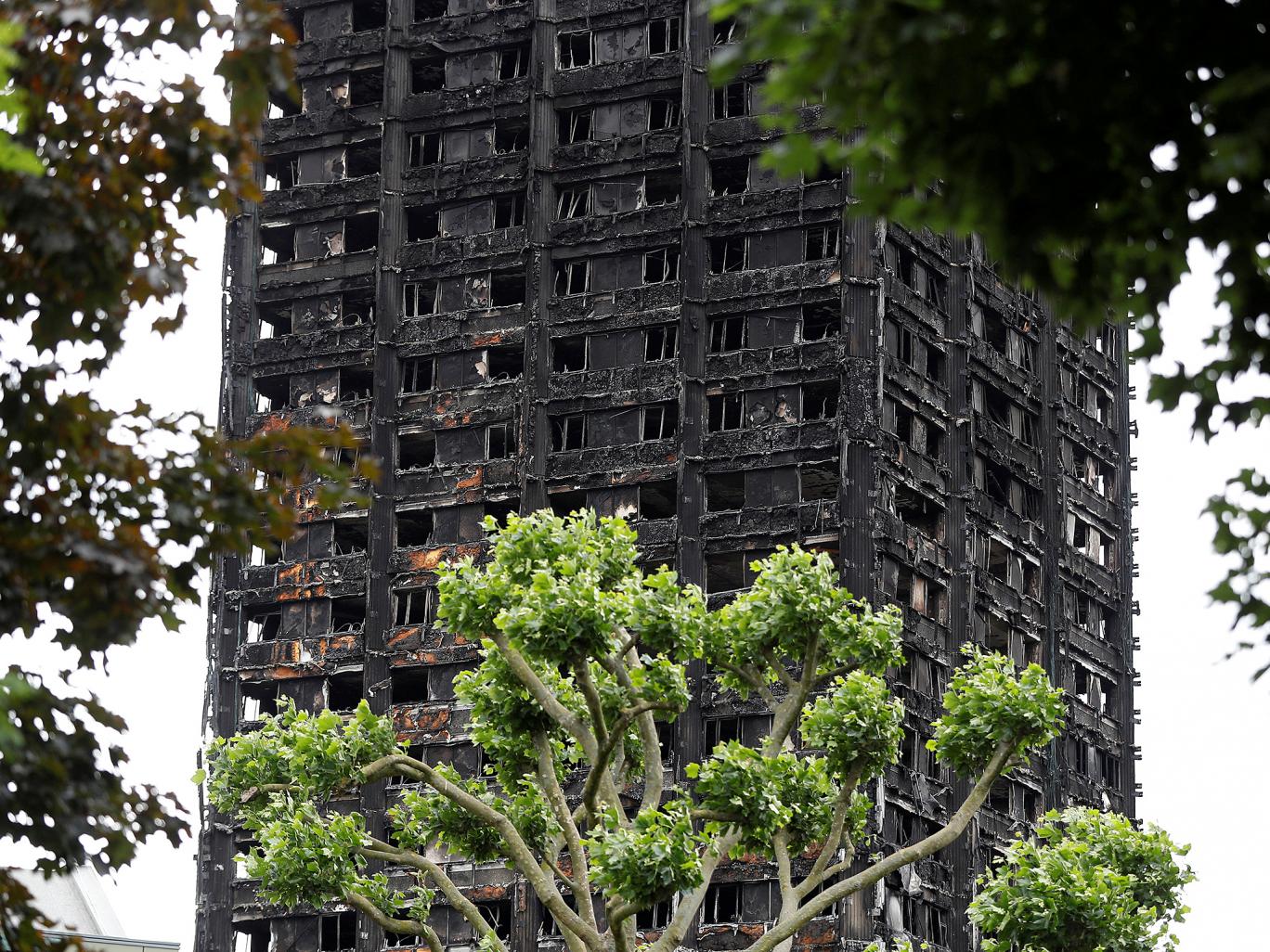
Grenfell residents and their blog was complaining about the power surge since their refurbishment. It’s really worrying that we having the same problem. As it’s strange for a fridge freezer to catch fire. Rumours are that it’s the electricity surges and the upgrade of the block that made the fridge catch fire. I can’t know for sure but I don’t believe that fridges randomly catch on fire .
After Grenfell I don’t trust the Tory Government , my local council or the Housing Association. It’s disgusting that a year after Grenfell many residents haven’t been rehoused. And that residents who live in high rises like Grenfell with this cladding are being ignored. Its stinks of class warfare to me. Our lives don’t matter in these austerity times.
The housing association lastly have put fire marshalls who are meant to walk the floors 24 hours a day, but many residents have complained that they are always downstairs on the ground floor and never seen walking the floors. If the fire alarm goes off they are meant to run up stairwells , go on each floor and alert residents to evacuate the building, but in practice they only seem to be on the second floor or on the ground floor when the fire alarm has sounded, which has made many residents feel unhappy and unsafe.
These are the reasons why many residents are unhappy living in these high rises, because their problems aren’t being addressed and they are being denied a move to safe accommodation.
You can join the ‘Safe Cladding and Insulation Now’ facebook group to share your story and hear from others here.
Full details of the Fuel Poverty action ‘Safe Cladding and Insulation Now’ campaign can be found in the Cladding & Insulation sections of our website.


